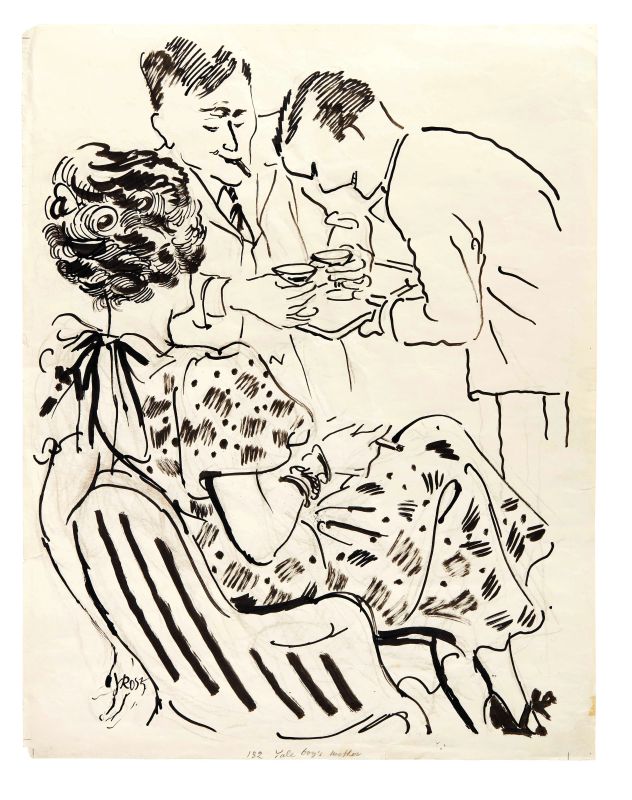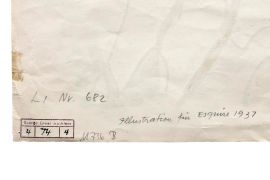George Grosz
(Berlin 1893 - 1959)
YALE BOY’S MOTHER
1937-1938
firmato in basso a sinistra, iscritto “182 Yale Boy’s Mother” in basso al centro
matita e china su carta
mm 591x461
sul retro: iscritto “Yale Boy’s Mother / Stevenson / Grosz”, timbro del George Grosz Estate col numero “4-74-4”
YALE BOY’S MOTHER
1937-1938
signed lower left, inscribed “182 Yale Boy’s Mother” lower centre
black chalk and Indian ink on paper
23 5/16 by 18 in
on the reverse: inscribed “Yale Boy’s Mother / Stevenson / Grosz”, George Grosz Estate stamp with number “4-74-4”
L’opera è corredata da certificato di autenticità rilasciato da Ralph Jentsch il 13 maggio 2019.
This work is accompanied by a certificate of authenticity issued by Ralph Jentsch on 13th May 2019.
Provenienza
Douglaston, Long Island (NY), studio dell’artista, 1937
George Grosz Estate, 1959
Considerato come uno dei più acuti e graffianti cronachisti della crisi morale della società borghese del primo dopoguerra, con l’avvento del nazismo, Grosz lasciò la Germania e si trasferì definitivamente negli Stati Uniti nel 1933. Nei disegni di questo periodo documenta con avido interesse la vita americana nelle sue tante sfaccettature. Il disprezzo nei confronti della middle class europea, caratteristico della sua precedente produzione, lascia così spazio a una satira in qualche modo compiacente verso l’american way of life. Il nostro disegno fu pubblicato sulle pagine della storica rivista americana Esquire nel febbraio del 1938, come illustrazione per l’articolo The Yale Boy’s Mother di Edward Stevenson. Con sicurezza di linea assoluta, Grosz studia e dettaglia le figure della donna elegantemente vestita e del seduttore che sta per servirle da bere, finendo per spingere le fisionomie dei personaggi al limite del caricaturale, del grottesco, come si evince dai tratti sommari e anonimi del cameriere, rappresentato come una sorta di automa in atteggiamento reverenziale.
In 1933, soon after the rise to power of the Nazi Party, Georg Grosz – considered one of the most acute and scathing chroniclers of the moral crisis of post-WWI bourgeois European society – left Germany for the United States, never to return. His drawings from this period document the many facets of life in the U.S. and betray his avid interest in his new surroundings. The disdain for the European middle class that marked his previous production thus left space for what we might call an accommodating satire of the American way of life. Our drawing was published in Esquire magazine’s February, 1938, issue as an illustration to the short story The Yale Boy’s Mother by Edward Stevenson. With an absolute confidence in his line, Grosz studies and details the figures of the elegantly-dressed matron and the seducer about to serve her a drink, pushing his portrayal to the limit of caricature, the grotesque, with the summarily sketched, anonymous features of the waiter, who is presented as a sort of automaton in a reverential pose.








